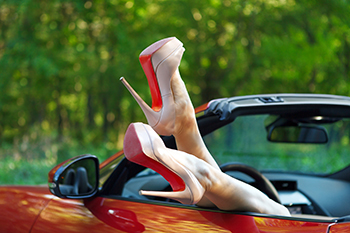
There’s an old saying: What price beauty? And when it comes to footwear for women, that is the question. Choosing fashion over foot health is common, but in many cases, a high price is paid. The footwear determined to be likely to cause foot, ankle, or toe pain are high heels, flip-flops, stilettos, shoes with pointy toes, and ballet flats. High heels often have pointy toe boxes and stiletto, or thin, heels. This leaves the wearer open to several problems, including pain in the ball of the feet, instability, and sprained ankles. They can also be responsible for bunion pain, corns, hammertoes, and claw toes. Flip-flops offer little to no support for the feet, causing the feet to work harder with each step and expose the heels to cracks and fissures. Because they contain limited cushioning, flip-flops may even contribute to heel pain from plantar fasciitis. Ballet flats rarely have arch support, offering little to no protection from injury, and can lead to knee, hip, and back problems. To learn more about shoes that can promote good health for your feet, please consult a podiatrist.
High heels have a history of causing foot and ankle problems. If you have any concerns about your feet or ankles, contact Gerald Erskine, DPM from Seneca Family Footcare. Our doctor can provide the care you need to keep you pain-free and on your feet.
Effects of High Heels on the Feet
High heels are popular shoes among women because of their many styles and societal appeal. Despite this, high heels can still cause many health problems if worn too frequently.
Which Parts of My Body Will Be Affected by High Heels?
- Ankle Joints
- Achilles Tendon – May shorten and stiffen with prolonged wear
- Balls of the Feet
- Knees – Heels cause the knees to bend constantly, creating stress on them
- Back – They decrease the spine’s ability to absorb shock, which may lead to back pain. The vertebrae of the lower back may compress.
What Kinds of Foot Problems Can Develop from Wearing High Heels?
- Corns
- Calluses
- Hammertoe
- Bunions
- Morton’s Neuroma
- Plantar Fasciitis
How Can I Still Wear High Heels and Maintain Foot Health?
If you want to wear high heeled shoes, make sure that you are not wearing them every day, as this will help prevent long term physical problems. Try wearing thicker heels as opposed to stilettos to distribute weight more evenly across the feet. Always make sure you are wearing the proper shoes for the right occasion, such as sneakers for exercising. If you walk to work, try carrying your heels with you and changing into them once you arrive at work. Adding inserts to your heels can help cushion your feet and absorb shock. Full foot inserts or metatarsal pads are available.
If you have any questions, please feel free to contact our office located in Ronceverte, WV . We offer the newest diagnostic and treatment technologies for all your foot care needs.
